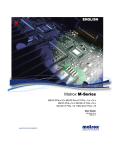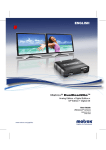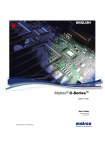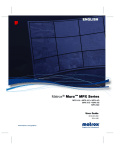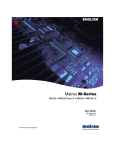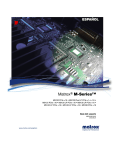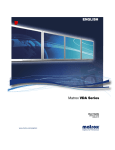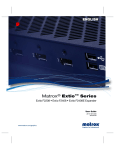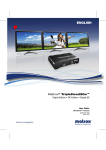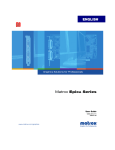Download RightClick AL Plus Series User guide
Transcript
ENGLISH Matrox® M-Series™ M9120 PCIe ×16 • M9120 Plus LP PCIe ×1 or ×16 • M9125 PCIe ×16 • M9128 LP PCIe ×16 • M9138 LP PCIe ×16 • M9140 LP PCIe ×16 • M9148 LP PCIe ×16 • M9188 PCIe ×16 User Guide 20070-301-0140 2013.01.25 Contents About this user guide ...............................................................................................4 Using this guide.........................................................................................................................................4 More information .....................................................................................................................................4 Overview ...................................................................................................................5 Hardware supplied....................................................................................................................................5 Software available......................................................................................................................................5 Installation overview.................................................................................................................................6 Installing your graphics hardware ...........................................................................7 Before you begin .......................................................................................................................................7 Step-by-step installation...........................................................................................................................8 Securing the bracket of your Matrox card ...............................................................................................9 Replacing brackets on your graphics card .............................................................................................10 Connecting your monitors .....................................................................................12 Before you begin .....................................................................................................................................12 Step-by-step connection setup ...............................................................................................................13 Installing your Matrox software ............................................................................20 Before you begin .....................................................................................................................................20 Hardware detection ................................................................................................................................21 Installing your display driver..................................................................................................................21 Matrox PowerDesk software .................................................................................22 Accessing PowerDesk..............................................................................................................................22 Accessing Matrox PowerDesk help.........................................................................................................22 Troubleshooting......................................................................................................23 What to do if you have a problem..........................................................................................................23 Common problems and solutions .........................................................................................................23 Product information ...............................................................................................35 Specifications ..........................................................................................................................................35 Environmental ........................................................................................................................................36 Notes........................................................................................................................................................37 Digital flat panel information ................................................................................................................37 2 Matrox M-Series – User Guide Customer support ................................................................................................. 38 Matrox Web.............................................................................................................................................38 Technical support ...................................................................................................................................38 Driver and software download...............................................................................................................39 View your warranty information...........................................................................................................39 Register your Matrox product................................................................................................................39 Index ...................................................................................................................... 40 Matrox M-Series – User Guide 3 About this user guide Your Matrox user guide provides information on installing and using your Matrox hardware. For information on Matrox PowerDesk software features and options, see the help file included with your PowerDesk software. Note: This guide has references specific to version 2.12.00 or later of the Matrox display driver. If you’re using a previous version of the Matrox display driver, certain references in this guide may not reflect the software you have. Using this guide This guide assumes you’re familiar with basic functions like click, right-click and double-click, and that you’re familiar with the basics of the operating system you’re using. Also, we use the following conventions: Bold for headings and for references to text that appears on-screen. Italics for emphasis, file names, paths, publication titles, and new terms. Bold Italics for emphasis. Keyboard keys in square brackets, with a plus sign separating keys that you press simultaneously. For example: press [Ctrl]+[Alt]+[Del] to start Windows Task Manager. Arrows (“Æ”) to separate ordered directions. For example, “click OK Æ Close Æ OK” is the same as “click OK, then click Close, then click OK”. Green for cross-references. If you’re viewing online, click green text to jump to what’s being referenced. More information We provide additional information in help and Readme files. Be sure to check for any last-minute release notes included with your product. Also, check the Matrox Web site (www.matrox.com/graphics) for the latest Matrox software, technical support, and product information. 4 Matrox M-Series – User Guide Overview Thank you for purchasing a Matrox M-Series graphics card. This is a high-performance graphics card that supports PCIe® (PCI Express®) ×1 or ×16 compliant systems and multi-monitor setups. Hardware supplied1 M9120 PCIe ×16 – Matrox graphics card, 2 DVI to HD-15 adapters. M9120 Plus LP PCIe ×1 or ×16 – Matrox graphics card, 1 dual-monitor cable (LFH-60 to DVI), 2 DVI to HD-15 adapters. M9125 PCIe ×16 – Matrox graphics card, 2 DVI to HD-15 adapters. M9128 LP PCIe ×16 – Matrox graphics card. M9138 LP PCIe ×16 – Matrox graphics card, 3 mini DisplayPort to DisplayPort adapters. M9140 LP PCIe ×16 – Matrox graphics card, 1 quad-monitor cable (KX20 to DVI), 4 DVI to HD-15 adapters. M9148 LP PCIe ×16 – Matrox graphics card, 4 mini DisplayPort to DisplayPort adapters, 4 DisplayPort to DVI-D adapters. M9188 PCIe ×16 – Matrox graphics card, 8 mini DisplayPort to DisplayPort adapters, 8 DisplayPort to DVI-D adapters. Software available Matrox PowerDesk – to use your Matrox graphics hardware. Matrox provides 32-bit and 64-bit versions of the display driver. Matrox PowerDesk software supports Windows® 8, Windows® Server® 2012, Windows® 7, Windows® Vista®, Windows® Server® 2008, Windows® Server® 2008 R2, Windows® XP, and Windows® Server® 2003. 1 The hardware supplied with your Matrox product may vary depending on the SKU or part number of your product. For more information, contact your Matrox representative. Matrox M-Series – User Guide 5 Minimum system requirements XDDM WDDM Up to 8 monitors Windows Vista (×32 Windows XP (×32 Edition), Edition), Service Pack 2, 2 Service Pack 3, 2 GB RAM* GB RAM* More than 8 monitors Windows XP (×32 Edition), Windows 7 (×64 Edition), 8 GB RAM Service Pack 3, 3 GB RAM* * For display resolutions above 1920 × 1200, we recommend 4 GB of RAM or higher. Installation overview Note: If your Matrox product is already partially or fully installed on your computer, some or all the installation information in this guide may not apply to you. However, this information may be useful if you need to reinstall your Matrox product. To install your Matrox product: 6 1 Install your Matrox graphics hardware – see page 7. 2 Connect your monitors – see page 12. 3 Install your Matrox software – see page 20. Matrox M-Series – User Guide Installing your graphics hardware This section describes how to install your Matrox card. For information specific to your computer, like how to remove its cover, see your system manual. Note: Most Matrox low-profile graphics cards ship with ATX brackets compatible with most systems. If you have a low-profile system, you may need to change the ATX bracket on your graphics card to a low-profile bracket. For more information, “Replacing brackets on your graphics card”, page 10. Before you begin To avoid personal injury and to prevent damage to your computer or Matrox hardware, read the following guidelines before installing your Matrox graphics hardware. Preventing damage to your graphics hardware Always turn off your computer, unplug it, then wait for it to cool before touching any of the internal parts of your computer or installing your Matrox product. While your computer is turned off but still plugged in, some electrical current is supplied to the motherboard. This current may prevent newly installed hardware from working properly. Static electricity can severely damage electronic parts. Before touching any electronic parts, drain static electricity from your body (for example, by touching the metal frame of your computer). When handling a card, carefully hold it by its edges and avoid touching its circuitry. Always try to insert or remove your card as straight as possible. Matrox M-Series – User Guide 7 Step-by-step installation 1 Open your computer and remove your existing graphics card* If a graphics card isn’t already installed in your computer, skip to step 2. If a graphics card is already installed in your computer: a Using Programs and Features (Windows 8/7/Vista) or Add/Remove Programs (Windows XP) in the Windows Control Panel, remove any currently installed display drivers. Restart your computer for the changes to take effect. After your computer restarts, you’re prompted to install drivers for the new graphics hardware detected. Click Cancel. Turn off your computer and all peripherals such as your monitor or printer. c Open the computer and remove your existing graphics card (if any). (If graphics hardware is built into the motherboard of your computer, you may need to disable it manually. For more information, see your system manual.) Most computers have different types of expansion slots. Choose a PCI Express (PCIe) ×16 or ×1 slot depending on the type of card you have. Your system manual should identify the location of each type of expansion slot in your computer. (Back of computer) PCI Express slots Choose an expansion slot PCI slots 2 b (×16) (×1) (32-bit) (64-bit) Note: We recommend using a PCIe ×16 slot with 16 lane support. If your system has multiple PCIe ×16 slots, your choice of PCIe slot may affect your card or system performance. For more information, see your computer manual. * With multi-display mode, you may be able to use your existing graphics card. For Windows XP, see Windows XP online help under “Install additional monitors”. For Windows Vista, see Windows Vista online help under “Add a second monitor”. 8 Matrox M-Series – User Guide WARNING: Inserting your Matrox card into the wrong type of slot could damage your card, your computer, or both. ×1 ×4 ×8 ×16 PCI Express card 3 Insert your Matrox card a Position your Matrox card over the expansion slot you’ve chosen. b Push the card in firmly and evenly until it’s fully seated in the slot. c Secure the bracket of your Matrox card to the computer frame. Your Matrox card is now installed. Before restarting your computer, connect your monitor or monitors (see “Connecting your monitors”, page 12). After connecting, restart your computer and install your Matrox software (see “Installing your Matrox software”, page 20). Securing the bracket of your Matrox card Matrox M9140 only – To support the weight of your quad-monitor cable and avoid damaging your graphics card, you also need to secure a washer to the bracket of your graphics card. 1 To secure the washer, slip it over the monitor connector, then screw the washer onto the bracket of your graphics card. 2 Make sure the washer lies flat against the frame of your computer. Washer Graphics card Matrox M-Series – User Guide 9 Replacing brackets on your graphics card Most Matrox low-profile graphics cards ship with ATX brackets compatible with most systems. Low-profile graphics cards The following explains how to change brackets on your Matrox low-profile product. 1 Remove the current bracket from your Matrox graphics card by removing the screw on top of the graphics card, then the nuts on either side of the monitor connector. 2 Attach and fasten the new bracket with the two nuts you just removed. ATX bracket Low-profile bracket DisplayPort™ low-profile graphics cards The following explains how to change brackets on your DisplayPort low-profile product. 1 Remove the current bracket from your Matrox graphics card by removing the two screws on top of the graphics card. ATX bracket 10 Matrox M-Series – User Guide 2 Attach and fasten the new bracket with the two screws you just removed. Low-profile bracket Matrox M-Series – User Guide 11 Connecting your monitors This section describes how to connect your monitors to your Matrox graphics hardware. Depending on your Matrox product, your connection setup changes (see “Step-by-step connection setup”, page 13). Note: To purchase any cables or adapters not included with your Matrox product, see the Matrox online store (shopmatrox.com). Before you begin To avoid possible problems that could damage your monitors or prevent you from using your Matrox product, read the following guidelines before connecting your Matrox graphics hardware. Whenever you change your connection setup, make sure you’re using the correct connectors and that all connectors are properly fastened. Don’t change monitor connections while your computer is turned on. While your computer is turned on, it may be using monitor settings that are specific to the current monitor connections. Some devices may be permanently damaged if incorrect settings are used. Whenever you restart your computer, make sure your monitors are already turned on. Otherwise, the software may not be able to properly detect your monitors. 12 Matrox M-Series – User Guide Step-by-step connection setup This section guides you through the step-by-step connection setup of your graphics hardware. M9120 PCIe or M9125 PCIe 1 Connect the first monitor Connect your preferred monitor to the main connector (A) on your Matrox graphics card. If your monitor has a DVI connector, connect it directly to the main connector of your graphics card. If your monitor has an HD-15 connector, use the DVI to HD-15 adapter included with your Matrox product to connect your monitor to the main connector. 2 Monitor connector (DVI) DVI to HD-15 adapter Monitor connector (HD-15) Connect the second monitor If your second monitor uses a DVI connector, connect it directly to the secondary connector (B) of your graphics card. Monitor connector (DVI) If your second monitor uses an HD-15 connector, use a DVI to HD-15 adapter included with your product to connect your monitor to the secondary connector. Monitor connector (DVI) Monitor connector (HD-15) Your Matrox card is now installed. Restart your computer and install your Matrox software (see “Installing your Matrox software”, page 20). Matrox M-Series – User Guide 13 M9120 Plus LP PCIe 1 Attach the dual-monitor cable Attach your dual-monitor cable to the connector on the bracket of your Matrox card. Dual-monitor cable WARNING: To avoid damaging the LFH-60 connector on your dual-monitor cable or on your graphics card, carefully insert the connector on your dual-monitor cable as straight as possible into the connector on your graphics card. Specifically, inserting the connectors into each other at an angle is likely to bend and damage the pins on the connector of the dual-monitor cable. 2 Connect your monitors Dual-monitor cable (DVI) If your monitor has a DVI connector, connect your monitor cable directly to the dual-monitor cable. If your monitor has an HD-15 connector, use a DVI to HD-15 adapter included with your product to connect your monitor cable to your dual-monitor cable. Monitor connector (DVI) DVI to HD-15 adapter Monitor connector (HD-15) Your Matrox card is now installed. Restart your computer and install your Matrox software (see “Installing your Matrox software”, page 20). 14 Matrox M-Series – User Guide M9128 LP PCIe WARNING: To avoid damaging the DisplayPort connector on your DisplayPort monitor cable or on your graphics hardware, carefully remove the DisplayPort cable by pressing the latch on the top of the DisplayPort connector while removing the connector. 1 Connect the first monitor If your monitor has a DisplayPort connector, connect your monitor directly to the DisplayPort connector labeled 1 on the bracket of your Matrox card. If your monitor has a DVI connector, use a DisplayPort to DVI-D adapter (sold separately) to connect your monitor cable to the DisplayPort connector. 2 Monitor connector (DisplayPort) DisplayPort to DVI-D adapter Monitor connector (DVI-D) Connect the second monitor If your monitor has a DisplayPort connector, connect your monitor directly to the DisplayPort connector labeled 2 on the bracket of your Matrox card. Monitor connector (DisplayPort) Matrox M-Series – User Guide 15 If your monitor has a DVI connector, use a DisplayPort to DVI-D adapter (sold separately) to connect your monitor cable to the DisplayPort connector. DisplayPort to DVI-D adapter Monitor connector (DVI-D) Your Matrox card is now installed. Restart your computer and install your Matrox software (see “Installing your Matrox software”, page 20). M9138 LP PCIe or M9148 LP PCIe WARNING: To avoid damaging the DisplayPort connector on your DisplayPort monitor cable or on your graphics hardware, carefully remove the DisplayPort cable by pressing the latch on the top of the DisplayPort connector while removing the connector. 1 Connect the first monitor Mini DisplayPort to DisplayPort adapter If your monitor has a DisplayPort connector, use a mini DisplayPort to DisplayPort adapter included with your product to connect your monitor cable to the mini DisplayPort connector labeled 1 on the bracket of your Matrox card. Monitor connector (DisplayPort) If your monitor has a DVI connector, use a DisplayPort to DVI-D adapter (sold separately for M9138 products) to connect your monitor cable to the mini DisplayPort to DisplayPort adapter. Monitor connector (DVI-D) 16 Matrox M-Series – User Guide DisplayPort to DVI-D adapter 2 Connect the other monitors Mini DisplayPort to DisplayPort adapter Repeat step 1 for each monitor you want to connect. Monitor connector (DisplayPort) Your Matrox card is now installed. Restart your computer and install your Matrox software (see “Installing your Matrox software”, page 20). M9140 LP PCIe 1 Connect your quad-monitor cable Attach your quad-monitor cable to the connector on the bracket of your Matrox card. 2 Quad-monitor cable Connect your monitors Quad-monitor cable (DVI) If your monitor has a DVI connector, connect your monitor cable directly to the quad-monitor cable. If your monitor has an HD-15 connector, use a DVI to HD-15 adapter included with your product to connect your monitor cable to your quad-monitor cable. Monitor connector (DVI) DVI to HD-15 adapter Monitor connector (HD-15) Matrox M-Series – User Guide 17 Note: Monitors are numbered consecutively based on which connector each is attached to. Numbering starts with the primary display – the one that first displays information when you restart your computer. If another graphics card is installed in your computer, display numbering may be different. Your Matrox card is now installed. Restart your computer and install your Matrox software (see “Installing your Matrox software”, page 20). M9188 PCIe WARNING: To avoid damaging the DisplayPort connector on your DisplayPort monitor cable or on your graphics hardware, carefully remove the DisplayPort cable by pressing the latch on the top of the DisplayPort connector while removing the connector. 1 Connect the first monitor Mini DisplayPort to DisplayPort adapter If your monitor has a DisplayPort connector, use a mini DisplayPort to DisplayPort adapter included with your product to connect your monitor cable to the mini DisplayPort connector labeled 1 on the bracket of your Matrox card. Monitor connector (DisplayPort) If your monitor has a DVI connector, use a DisplayPort to DVI-D adapter included with your product to connect your monitor cable to the mini DisplayPort to DisplayPort adapter. Monitor connector (DVI-D) 18 Matrox M-Series – User Guide DisplayPort to DVI-D adapter 2 Connect the other monitors Repeat step 1 for each monitor you want to connect. Mini DisplayPort to DisplayPort adapter Monitor connector (DisplayPort) Your Matrox card is now installed. Restart your computer and install your Matrox software (see “Installing your Matrox software”, page 20). Matrox M-Series – User Guide 19 Installing your Matrox software This section describes how to install Matrox software for Windows 8, Windows Server 2012, Windows 7, Windows Vista, Windows Server 2008, Windows Server 2008 R2, Windows XP, and Windows Server 2003. The installation of the display driver is the same for the 32-bit and 64-bit versions. You may need administrator rights to install certain software. For more information, see Windows documentation or contact your system administrator. Before you begin This guide has references specific to the Matrox CD-ROM. If your Matrox product wasn’t packaged by Matrox (for example, if it was included with your computer), your product may not include this CD-ROM. If you don’t have this CD-ROM, certain references in this guide may not reflect the software you have. For more information, see other software documentation provided by your system vendor. If your Matrox product was provided by the manufacturer of your computer, check the Web site of that manufacturer for the latest display driver. A display driver provided by the manufacturer of your computer is more likely to be tested with your computer model. You may need administrator rights to install or uninstall certain software. For more information, see Windows documentation. Obtaining a display driver Matrox makes the latest display drivers available on the Matrox Technical Support Web site (www.matrox.com/graphics/en/support/drivers). Selecting the proper display driver Matrox makes available two types of display drivers. The display driver you install depends on the operating system you’re using and the graphics hardware installed in your system: Windows 8/7/Vista – WDDM (Windows Vista Display Driver Model) display drivers are designed and optimized for Windows versions beginning with Windows Vista. Select this display driver if you’re using either Windows 8, Windows 7, or Windows Vista. Also, select this display driver if you have only M-Series graphics hardware installed in your system. 20 Matrox M-Series – User Guide Windows 7/Vista/XP – XDDM (Windows XP Display Driver Model) display drivers are designed for Windows XP. This is a unified display driver. Select this display driver if you have different models of graphics hardware (for example, a P-Series and an M-Series graphics card) installed in your system. Hardware detection Windows 8 – Windows detects new hardware when you restart and installs a Microsoft Basic Display Adaptor. Windows 7/Vista – Windows detects new hardware when you restart and installs a standard VGA driver. Windows XP – Windows detects new hardware when you restart. If Matrox display drivers haven’t been previously installed, Windows prompts you to install a display driver. When prompted by the Found New Hardware wizard to install a display driver for your graphics hardware, click Cancel. Matrox M-Series – User Guide 21 Matrox PowerDesk software Your Matrox display driver includes Matrox PowerDesk software. This software helps you get the most out of your Matrox product. Use Matrox PowerDesk software to change certain display settings or access Matrox features. Note: To avoid possible problems, unless otherwise specified, we recommend you use only PowerDesk software to change your display settings. Accessing PowerDesk Windows 8/7/Vista/XP – To access Matrox PowerDesk: Windows 8 – Open the Start screen, then select Matrox PowerDesk. Right-click your Windows desktop and select Launch Matrox PowerDesk. Windows 7/Vista/XP – Click Start Æ All programs (or Programs) Æ Matrox Graphics Æ Matrox PowerDesk. Right-click your Windows desktop and select Launch Matrox PowerDesk. Accessing Matrox PowerDesk help For information on Matrox PowerDesk software features and options, see the help file included with your PowerDesk software. While using Matrox PowerDesk software, you can access the help file in several ways: From the main PowerDesk interface, click Help and Troubleshooting Æ PowerDesk help. For information on a specific feature or control on a page, click the Help button ( on that page. To find all topics that contain specific words, use the Search tab in the navigation window of the help file. 22 Matrox M-Series – User Guide ) Troubleshooting What to do if you have a problem If you experience problems with your Matrox product: Make sure your Matrox card is properly installed, you’re using the correct connectors, and that all connectors are properly fastened. For more information, see “Installing your graphics hardware”, page 7 and “Connecting your monitors”, page 12. Review the documentation provided with your Matrox product, including the information in this section, to see if your problem is already addressed. If your problem persists, contact Matrox. For more information, see “Customer support”, page 38. Common problems and solutions This section addresses common problems that could prevent you from using your computer or graphics hardware. Problem Computer doesn’t display information or boot after Matrox card is installed 1Cause If you have more than one PCIe ×16 slot, your graphics card may be using a slot that doesn’t have 16 lane support. 1Solution Try moving the PCIe card to another PCIe slot in your computer. For more information on the PCIe support of your system, see your system manual. 2Cause 1Solution 3Cause 1Solution There may be unsupported graphics hardware in your computer. If graphics hardware is built into your computer motherboard, your system may not have automatically disabled it when you inserted your Matrox card. Check your system manual for instructions on how to disable your computer’s built-in graphics hardware. The BIOS of your Matrox graphics card may need to be updated or restored. For advanced users – If your primary display is unusable and you have another VGA-compatible graphics card (PCI™): 1 Turn off your computer and insert the other graphics card into an expansion slot. For more information on expansion slots, see “Choose an expansion slot”, page 8. Matrox M-Series – User Guide 23 2 Plug your monitor into the other graphics card and restart your computer. Note: Make sure your computer uses the other graphics card to control your primary display. The graphics card that controls your primary display is the one that first displays information when you restart your computer. Your computer BIOS (Basic Input/Output System) and the slot type (PCI or PCIe – see “Choose an expansion slot”, page 8) of each graphics card help determine which graphics card controls your primary display. To control which graphics card is used for your primary display, you may be able to change the configuration of your computer BIOS. For information on how to change your computer BIOS settings, see your system manual. Problem 1Cause 1Solution 3 Download the latest BIOS update for your Matrox product. Matrox makes new BIOS updates available on the Matrox Technical Support Web site (www.matrox.com/graphics/en/support/drivers). 4 Run the software package you downloaded. Follow the on-screen instructions. 5 After the update is finished, turn off your computer, remove the other graphics card, then plug your monitor into your Matrox graphics card. 6 Restart your computer. Wrong color balance, screen image off-center, or no picture at all Your monitor video controls may be improperly set. Adjust your monitor controls (brightness, contrast, and so on). For more information, see your monitor manual. 2Cause Your monitor may not be properly connected (the connectors aren’t properly fastened or the monitor power cable isn’t firmly in place) or may have been disconnected. 1Solution Make sure you’re using the correct connectors, that all connectors are properly fastened, and that all power cables are firmly in place. For more information, see “Connecting your monitors”, page 12. 3Cause If your monitor supports multiple input sources (analog/digital), it may be configured to use the wrong source. 1Solution Make sure your monitor is using the correct input source. For more information on selecting the input source for your monitor, see your monitor documentation. 24 Matrox M-Series – User Guide 2Solution Change your connection setup to use a different input source. For more information, see “Connecting your monitors”, page 12. Problem After the startup screen, or after display settings are changed, the screen image is garbled or unusable (blank screen, rolling or overlapping screen images) 1Cause Analog monitors only – The Matrox display driver may be trying to use settings your monitor doesn’t support. This can happen if the display resolution was changed to one your monitor doesn’t support or if the monitor connected to your computer was changed without changing the display or monitor settings in the software. WARNING: If incorrect software monitor settings are applied, some monitors can be permanently damaged. For more information, see your monitor manual. 1Solution Make sure your monitor supports the display mode currently in use. After installing your Matrox product, your system uses either the preferred display mode for your monitor or a display mode of 800 × 600 at 60 Hz. 2Solution If none of your displays are available, reinstall your Matrox display drivers. For more information on reinstalling your display driver, see the following solution. 2Cause 1Solution Files on your system may have been deleted or corrupted. Uninstall, then reinstall Matrox software: Note: Before removing software, make sure you have all the necessary files to reinstall software that may still be needed. Also, make sure the display driver you reinstall supports all Matrox products in your computer. For more information, see “Selecting the proper display driver”, page 20. Note: You may need administrator rights to uninstall certain software. For more information, see Windows documentation. Windows 8/7/Vista/XP – 1 If your primary display is unusable, restart your computer in VGA mode: a Windows 8 – Open the Settings charm, click Power, then select Restart to restart your computer. Windows 7 – Click Start, point to the arrow ( your computer. ), then select Restart to restart Matrox M-Series – User Guide 25 Windows Vista/XP – Click Start Æ Shut Down* Æ Restart Æ OK* to restart your computer. (* Depending on your version and configuration of Windows, this part of the step may not be necessary.) If your primary monitor is unusable, see your system manual for information on how to restart your computer using a hardware control. b Before Windows starts, press [F8] for the Windows startup menu to appear. (If [F8] doesn’t work, instead try pressing and holding [Ctrl] before Windows starts.) c Select “VGA mode” (or “Low resolution video”), then press [Enter]. Note: If your system stops responding while it’s in VGA mode, select “Safe mode” instead. 2 To uninstall Matrox software: Windows 8 – a Open the Settings charm, then click Control Panel Æ Hardware and Sound Æ Mouse. b Click Matrox Driver (or Matrox M-Series Driver) Æ Uninstall Æ Yes. Windows 7/Vista – a Click Start Æ Settings* Æ Control Panel Æ Programs* Æ Programs and Features Æ Matrox PowerDesk (or Matrox PowerDesk-SE) Æ Uninstall Æ Yes. (* Depending on your version and configuration of Windows, this part of the step may not be necessary.) b Click Matrox Driver (or Matrox M-Series Driver) Æ Uninstall Æ Yes. Windows XP – a Click Start Æ Settings* Æ Control Panel Æ Add/Remove Programs (double-click*) Æ Matrox PowerDesk (or Matrox PowerDesk-SE) Æ Change/Remove Æ Yes. (* Depending on your version and configuration of Windows, this part of the step may not be necessary.) b Click Matrox Driver Æ Change/Remove Æ Yes. 3 Restart your computer for the changes to take effect. 4 After your computer has restarted, install the latest display driver for your Matrox card. You may also need to reinstall other Matrox software. 26 Matrox M-Series – User Guide Problem Can’t use Windows, Windows reports a configuration error, and/or can’t install or uninstall Matrox display driver Note: You may need administrator rights to install certain software. For more information, see Windows documentation. 1Cause 1Solution 2Cause The problem may be specific to the motherboard in your computer. There may be a software update available for your motherboard. To find out what motherboard model your computer is using, see your system manual. For more information, contact the maker of your motherboard or computer. Many motherboard or computer manufacturers have software updates available on their Web site. Files on your system may have been deleted or corrupted. 1Solution Uninstall, then reinstall Matrox software. For more information, see page 25. Problem Monitor settings aren’t automatically detected WARNING: If incorrect software monitor settings are used, your display may become unusable and some monitors can be permanently damaged. For more information, see your monitor manual. 1Cause Your monitor may not be detected by the software. 1Solution Restart your computer. If your monitor is a Plug-and-Play (DDC) monitor, it should be automatically detected by the software. Problem Built-in network hardware doesn’t work after graphics card is installed 1Cause The installation of a graphics card may have caused your computer to reallocate system resources. 1Solution Try reinstalling your network drivers. 2Solution Try moving your Matrox graphics card to another PCIe slot in your computer. For instructions on how to safely install your Matrox card, see “Installing your graphics hardware”, page 7. Matrox M-Series – User Guide 27 2Cause You may be using Windows XP Service Pack 2. 1Solution Install Service Pack 3 for Windows XP. To obtain a Microsoft Service Pack, contact your system vendor or see the Microsoft Web site (www.microsoft.com). Problem Using multiple displays under Windows 7/Vista/XP program doesn’t work with your Matrox product 1Cause Your main graphics card may not be controlling your primary display. The graphics card that controls your primary display is the one that first displays information when you restart your computer. A program that doesn’t recognize multiple displays may not work with a graphics card unless it’s controlling your primary display. Your computer BIOS (Basic Input/Output System) and the slot type (PCI or PCIe – see “Choose an expansion slot”, page 8) of each graphics card help determine which graphics card controls your primary display. 1Solution If you’re having problems with a program that can be moved on your Windows desktop, run this program on your primary display. Make sure the program window doesn’t overlap any other display. If the program doesn’t work with the graphics card controlling your primary display, or you want your main graphics card to control your primary display, see the other solutions. 2Solution Windows XP and Windows Server 2003 – If you’re having problems with a program that can’t be moved on your Windows desktop, try changing your primary display. 1 2 Right-click your Windows desktop background, then click Properties Æ Settings. Select the display you want as the primary display and enable Use this device as the primary monitor. 3 3Solution Click OK or Apply for your changes to take effect. Change the configuration of your computer BIOS so that the slot type of your main graphics card has priority for becoming the primary display. For information on how to change your computer BIOS settings, see your system manual. If your computer BIOS doesn’t let you select which slot type has priority for becoming the primary display, a BIOS update may be available to let you do this. (The BIOS of most computers can be updated with software.) For a possible BIOS update for your computer, contact your system vendor. 4Solution If there’s a graphics controller built into the motherboard of your computer, by changing your computer BIOS settings, you may be able to change which device controls your primary display. For more information, see your system manual. 28 Matrox M-Series – User Guide 5Solution If you don’t need to use the graphics card that’s controlling your primary display, remove it from your computer. If your primary display is controlled by the motherboard of your computer, see your system manual for information on how to disable this graphics controller. 2Cause The program you’re using may not work properly with systems using more than one display at a time. 1Solution An update may be available for the program you’re using. This update may fix problems this program has with multi-display systems. For more information, contact the software distributor for the program you’re using. 2Solution If you’re using multiple displays in independent mode, try using stretched mode instead. Programs that don’t work in independent mode may work in stretched mode. For more information, see Matrox PowerDesk help. Problem Not all graphics cards in the computer are fully supported (Software doesn’t work with a certain graphics card, or another graphics card doesn’t work at all) 1Cause If you have different models of graphics cards in your computer, your Matrox display driver may not support all the graphics cards in your computer. 1Solution Under Windows 7/Vista/XP, you can use different XDDM display drivers for different products. Software that depends on a specific display driver feature may not work if your graphics hardware is using different display drivers. For more information, see “Selecting the proper display driver”, page 20. 2Solution Disable or remove any graphics hardware not supported by the display driver you want to use. If there’s graphics hardware built into the motherboard of your computer that’s not supported by your software, see your system manual for information on how to disable this graphics hardware. 2Cause Windows 8/7/Vista/XP – If the Windows method for display driver installation was used (instead of running the setup program included with your Matrox display driver), the driver may not be installed for all the graphics cards it supports. 1Solution Run the setup program included with the Matrox display driver. The setup program automatically installs the display driver for each Matrox graphics card it supports. Matrox M-Series – User Guide 29 Problem 1Cause 1Solution Screen image defects appear, program doesn’t run properly, or Windows doesn’t work properly (example: mouse pointer not drawn properly) Some programs may not work properly with some Matrox acceleration. Windows 8/7/Vista/XP – Disable Windows effects: Windows 8 – 1 Open the Settings charm, then click Control Panel Æ System and Security Æ System Æ Advanced system settings. 2 Under Performance, click Settings. 3 Disable one or more features. 4 Click OK Æ OK. Windows 7 – 1 Click Start Æ Settings* Æ Control Panel Æ System and Security* Æ System Æ Advanced system settings. (* Depending on your version and configuration of Windows, this part of the step may not be necessary.) 2 Under Performance, click Settings. 3 Disable one or more features. 4 Click OK Æ OK. Windows Vista – 1 2 Right-click your Windows desktop background, then click Personalize Æ Window Color and Appearance. If you’re using Windows® Aero®, click Open classic appearance properties for more color options. Under Color scheme, select Windows Vista Basic. 3 Click Effects and then disable one or more features. 4 Click OK Æ OK. Windows XP – 1 Right-click your Windows desktop background, then click Properties Æ Appearance Æ Effects. 2 Disable one or more features. 3 Click OK Æ OK. 30 Matrox M-Series – User Guide 2Solution Windows Vista – Disable Windows Aero. Right-click your Windows desktop background, then click Personalize Æ Window Color and Appearance Æ Open classic appearance properties for more color options. Under Color, select Windows Vista or Windows Classic. 3Solution If possible, update your Matrox display driver. Matrox makes new display drivers available on the Matrox Technical Support Web site (www.matrox.com/graphics/en/support/drivers). Note: If your Matrox product was provided by the manufacturer of your computer, check the Web site of that manufacturer for the latest display driver. A display driver provided by the manufacturer of your computer is more likely to be tested with your computer model. Note: If you identify a program that doesn’t work well with Matrox acceleration, please contact Matrox technical support (see page 38) and describe the problem. This information may help us come up with a fix or work-around in a future driver release. Problem 1Cause 1Solution 2Cause 1Solution 3Cause 1Solution Program window or dialog box doesn’t appear on screen Another window or dialog box may be covering the window or dialog box you want to see. Move, close, or minimize any window or dialog box that may be covering the window or dialog box you want to see. If you’re using multi-display mode, the program window or dialog box may be in a display or on a monitor that’s unusable. (For example, your monitor may not be properly connected or configured.) Make sure all the displays and monitors you want to use are usable. For more information, see other troubleshooting items in this guide. The software may be using a display you didn’t intend to use or the software may be configured to use more displays than the actual number of monitors you have. Disable the display: Windows 8/7/Vista/XP – 1 From the main interface of PowerDesk (see “Accessing PowerDesk”, page 22), click Multi-Display Setup. 2 In the work area, select the display you want to disable, and then drag it to the Unused outputs section. (You can also disable the display by right-clicking it and selecting Remove.) 3 Click OK to apply your changes. Matrox M-Series – User Guide 31 4Cause The program window or dialog box may be somewhere off-screen. 1Solution If the program window you want to see is named on the Windows taskbar, right-click on it and select Maximize. (If you click Restore the program window goes back to its previous position. To fix this problem, see the other solutions.) 2Solution Manually move the program window or dialog box: 1 Make sure the window you want to move is selected, then press [Alt]+[Space]. 2 If you see a pop-up menu, click Move. If you don’t see a pop-up menu, press [M] (for Move). 3 Press on one of the arrow keys once and move your mouse pointer to where you want the window or dialog box to appear, then click. The program window or dialog box should appear where you clicked. Problem Display on digital monitor appears blurry or uses only a portion of the screen 1Cause You may be using a lower display resolution than what your digital monitor supports. If your monitor supports display scaling, the image on your screen may appear blurry. If display scaling isn’t supported, the display may use only a portion of your screen. 1Solution Select the highest display resolution available. This generally results in better image quality. Problem Can’t apply Windows Aero color scheme (Windows 7 only) 1Cause 1Solution You may be using a display driver designed for Windows XP (XDDM). Windows Aero is supported only with a display driver designed for Windows Vista (WDDM). For more information, see “Selecting the proper display driver”, page 20. 2Cause You may be using a 16-bit color palette. 1Solution Try using a 32-bit color palette instead. Problem Video file playback is jerky (skipping frames) Note: Jerky video file playback may be the result of slow playback or recording. Slow recording causes frames to be dropped (frames aren’t recorded). If jerky video is caused by frames that were dropped during recording or by the video settings such as the encoding method, the problem can only be fixed by recapturing the video under better conditions or with different video settings. 32 Matrox M-Series – User Guide 1Cause 1Solution Your hard disk may be too slow. If possible, try using a faster disk. Tip: If your computer has more than one hard disk, you may get better results if you play back video files from a disk other than the one where the Windows swap file is stored. The Windows swap file is usually stored on drive “C:”. 2Cause Your video player may not properly support the video file format. 1Solution Try using a different video player. Problem Mouse pointer flickers or disappears when it’s over a video window 1Cause 1Solution You may be using a customized mouse pointer. Windows draws customized mouse pointers in a way that may cause them to flicker or disappear while they’re over a video window. Windows 8/7/Vista/XP – Use default Windows mouse pointers: 1 Windows 8 – Open the Settings charm, then click Control Panel Æ Hardware and Sound Æ Mouse. Windows 7/Vista/XP – Click Start Æ Settings* Æ Control Panel Æ Hardware and Sound* Æ Mouse (double-click*). (* Depending on your version and configuration of Windows, this part of the step may not be necessary.) Windows XP – Click Start Æ Settings* Æ Control Panel Æ Printers and Other Hardware* Æ Mouse (double-click*). (* Depending on your version and configuration of Windows, this part of the step may not be necessary.) Problem 1Cause 2 Click the Pointers tab. 3 In the Scheme box, select (or reselect) “(None)”, then click OK. Can’t play certain videos The video source may be copy protected. 1Solution The media player you’re using may not allow you to play back copy-protected video content. 2Cause A DVD video may not play back because the region setting on your DVD player doesn’t match the region code on the DVD-ROM disc. DVD players and videos use region codes to prevent the playback of video that was intended only for a certain region or market. 1Solution To get a copy of a DVD video that’s compatible with the region code of your DVD player, contact the vendor of that video. Matrox M-Series – User Guide 33 Problem 1Cause 1Solution Can’t record video The video source may be copy protected. Your Matrox product may not let you make copies of copy-protected video. (Some video sources let you make a copy of a video, but you may not be able to make a copy of that copy.) To get copies of a copy-protected video, contact the vendor of the video. 34 Matrox M-Series – User Guide Product information Specifications M9120 PCIe Operating systems supported Digital monitor support Memory Card type Form factor Monitors supported Connectors Maximum analog resolution Maximum digital resolution Maximum card dimensions M9120 Plus LP PCIe M9125 PCIe M9140 LP PCIe Windows 8, Windows Server 2012, Windows 7, Windows Server 2008 R2, Windows Vista, Windows Server 2008, Windows XP, and Windows Server 2003 DVI DVI Dual-link DVI DVI 512 MB 512 MB 512 MB 512 MB PCIe ×16 PCIe ×1 or ×16 PCIe ×16 PCIe ×16 ATX Low-profile ATX Low-profile 2 2* 2 4 2× DVI 1× LFH-60 2× DVI 1× KX20 2048 × 1536 2048 × 1536 2048 × 1536 1920 × 1200 1920 × 1200 1920 × 1200 Up to 1920 × 1200, and 2560 × 1600 1920 × 1200 L: 6.600" / 16.80 cm H: 4.376" / 11.10 cm W: 0.750" / 1.91 cm L: 6.600" / 16.80 cm H: 2.712" / 6.90 cm W: 0.750" / 1.91 cm L: 6.600" / 16.80 cm H: 4.376" / 11.10 cm W: 0.750" / 1.91 cm L: 6.600" / 16.80 cm H: 2.712" / 6.90 cm W: 0.750" / 1.91 cm * Quad analog display upgrade kit available (see shopmatrox.com). Matrox M-Series – User Guide 35 M9128 LP PCIe Operating systems supported Digital monitor support M9138 LP PCIe M9148 LP PCIe M9188 PCIe Windows 8, Windows Server 2012, Windows 7, Windows Server 2008 R2, Windows Vista, Windows Server 2008, Windows XP, and Windows Server 2003 DVI, DisplayPort DVI, DisplayPort DVI, DisplayPort DVI, DisplayPort 1 GB 1 GB 1 GB 2 GB PCIe ×16 PCIe ×16 PCIe ×16 PCIe ×16 Low-profile Low-profile Low-profile ATX Memory Card type Form factor Monitors supported 2 3 4 8 2× DisplayPort 3× Mini DisplayPort 4× Mini DisplayPort 8× Mini DisplayPort Maximum digital (DVI) resolution 1920 × 1200 1920 × 1200 1920 × 1200 1920 × 1200 Maximum DisplayPort resolution 2560 × 1600 2560 × 1600 2560 × 1600 2560 × 1600 L: 6.600" / 16.80 cm H: 2.712" / 6.90 cm W: 0.750" / 1.91 cm L: 6.600" / 16.80 cm H: 2.712" / 6.90 cm W: 0.750" / 1.91 cm L: 6.600" / 16.80 cm H: 2.712" / 6.90 cm W: 0.750" / 1.91 cm L: 9.000" / 22.86 cm H: 4.407" / 11.19 cm W: 0.750" / 1.91 cm Connectors Maximum card dimensions Environmental Temperature, operational 5 to 55 ºC (41 to 131 ºF) (near board ambient) Temperature, non-operational storage and transportation -40 to 70ºC (-40 to 158 ºF) Humidity, operational (indoor) 20 to 80% (non-condensing) Humidity, non-operational storage and transportation 10% to 95% (non-condensing) Atmospheric pressure, operational 650hPa (3,580 meters / 11,745 feet) to 1013hPa (0 meters / 0 feet) Atmospheric pressure, non-operational and transportation 192hPa (12,000 meters / 39,370 feet) to 1020hPa (-50 meters / -164 feet) 36 Matrox M-Series – User Guide Notes Your Matrox graphics card is 100% VGA compatible. It’s also compatible with the following VESA® standards: VBE 3.0 (Super VGA modes), DPMS (energy saving), and DDC-2B (Plug-and-Play monitor), DDC-CI, and DisplayPort 1.1a. To get the most of your Matrox product, we recommend using the highest color palette setting (a 32-bit color palette) for all your displays. The display resolutions and refresh rates available depend on your Matrox graphics card, display driver, software monitor settings, and monitor. For information on the capabilities of your monitor, see your monitor documentation. If your digital monitor doesn’t support reduced blanking, your screen image may not display properly. While using four monitors or more in stretched mode, using a resolution higher than 1600 × 1200 may cause tearing or reduced performance during video playback. M9188 PCIe – Windows 8/7/Vista – While using Matrox M9188 graphics hardware certain limitations may apply. For more information, see Matrox PowerDesk help. Digital flat panel information TMDS® (Transition Minimized Differential Signaling) encoding for DVI connectors DDWG (Digital Display Working Group) compliant DVI connector EDID (Extended Display Identification Data) 1.2 and 1.3 support VESA Display Data Channel (DDC) support Compatible with VESA DisplayPort 1.1a Matrox M-Series – User Guide 37 Customer support Matrox Web Our Web site has product literature, press releases, technical material, a sales office list, trade show information, and other relevant material. Visit the Matrox Graphics Web site at www.matrox.com/graphics. Technical support Matrox values your business and offers professional support for your Matrox product. If your product was purchased through a Matrox dealer, contact your dealer for product support. This is the quickest and most effective method of technical assistance. Your dealer is familiar with your complete system. If your product was purchased through Matrox, contact your Matrox representative or visit our technical support Web site at www.matrox.com/graphics/support. Information we need Please give a complete description of the problem, and include: Matrox card serial number, model number, revision number, BIOS number, driver type and version, and memory address at which the Matrox card is installed. Computer brand and model name. Monitor brand and model name. Operating system, version, and service pack. Brand and model of any other cards and devices installed on your system. Program specific problems If a problem appears with a specific program, please give us the following information: Display settings (color palette, display resolution, and so on) applied when the problem occurs. If possible, take note of the file and segment address that caused the problem. Detailed steps known to cause the bug, so we can reproduce it. 38 Matrox M-Series – User Guide Driver and software download A more recent display driver may support more features and may offer increased capabilities (such as higher display resolutions). Matrox makes the latest display drivers, software, and system utilities available on the Matrox Technical Support Web site (www.matrox.com/graphics/en/support/drivers). View your warranty information Matrox makes warranty information available on the Matrox site (www.matrox.com/graphics/en/about/warranty). Register your Matrox product Please register online (www.matrox.com/graphics/en/registration) to be eligible for customer support, new product announcements, and information on special offers and upcoming events. Matrox M-Series – User Guide 39 Index B BIOS 24, 28 Bracket Replacing 10 Securing 9 H S Hardware 5 Acceleration 30, 31 Installation 7–11 Software Download 39 Installation 20–21 Specifications Environmental I C 20, 21 Connection setup 12–19 DisplayPort 15, 16, 18 CD-ROM, Matrox Connector DisplayPort 15, 16, 18 DVI 14, 17 HD-15 14, 17 LFH-60 14 Mini DisplayPort 16 Customer support Installation Hardware 7–11 Overview 6, 12 Monitor Settings 28 E Environtmental Specifications Expansion slots 38 23–34 U 24–25 Multi-display Mode 29 User Guide About 4 V 37 37 Video 32, 33, 34 VESA 5, 8 PowerDesk 5, 22 Accessing 22 Help 4, 22 Software 4 VGA Product information 35–37 Features 6 Specifications 35 Warning PCI Express Display driver Manufacturer 20, 31 Matrox 20 Selecting 20 Technical support M P Display Primary T Troubleshooting 38–39 D 36 W 9, 16, 25, 27 39 WDDM driver 20, 32 Web, Matrox 38 Warranty R 36 8 40 Matrox M-Series – User Guide Registration 39 X XDDM driver 21, 29, 32 USA FCC Compliance Statement Remark for the Matrox hardware products supported by this guide This equipment has been tested and found to comply with the limits for a Class B digital device, pursuant to Part 15 of the FCC Rules. These limits are designed to provide reasonable protection against harmful interference in a residential installation. This equipment generates, uses and can radiate radio frequency energy and, if not installed and used in accordance with the instructions, may cause harmful interference to radio communications. However, there is no guarantee that interference will not occur in a particular installation. If this equipment causes harmful interference to radio or television reception, which can be determined by turning the equipment off and on, the user is encouraged to try to correct the interference by one or more of the following measures: • Reorient or relocate the receiving antenna • Increase the separation between the equipment and receiver • Connect the equipment into an outlet on a circuit different from that to which the receiver is connected • Consult the dealer or an experienced radio/TV technician for help. WARNING Changes or modifications to this unit not expressly approved by the party responsible for the compliance could void the user’s authority to operate this equipment. Declaration of conformity of a Class B digital device according to the FCC rules We, the Responsible Party Matrox, 625 State Route 3, Unit B, Plattsburg, NY 12901 • Telephone: (514) 822-6000 (extension 2026) • Attention: Conformity Group Matrox Declaration The Matrox hardware products supported by this guide comply with Part 15 of the FCC Rules. Operation is subject to the following two conditions: (1) these devices may not cause harmful interference, and (2) these devices must accept any interference received, including interference that may cause undesired operation. Any question regarding this declaration should be forwarded to the above coordinates. CANADA (English) Industry Canada Compliance Statement Remark for the Matrox hardware products supported by this guide These digital devices do not exceed the Class B limits for radio noise emission from digital devices set out in the Radio Interference Regulation of Industry Canada. (Français) Conformité avec les exigences du ministère de l’Industrie Canada Remarque sur les produits matériels Matrox couverts par ce guide Ces appareils numériques n’émettent aucun bruit radioélectrique dépassant les limites applicables aux appareils numériques de Classe B prescrites dans le Règlement sur le brouillage radioélectrique édicté par Industrie Canada. JAPAN VCCI Compliance Statement Remark for the Matrox hardware products supported by this guide This is a Class B product based on the standard of the Voluntary Control Council for Interference from Information Technology Equipment (VCCI). If this is used near a radio or television receiver in a domestic environment, it may cause radio interference. Install and use the equipment according to the instruction manual. KOREA KCC 전자파 적합 등록 안내 (Class B) 이 기기는 가정용 (B 급 ) 으로 전자파적합등록을 한 기기로 주거 지역에서는 물론 모든 지역 에서 사용할 수 있습니다 . EUROPE (English) European user’s information – Declaration of Conformity Remark for the Matrox hardware products supported by this guide These devices comply with EC Directive 2004/108/EC for a Class B digital device. They have been tested and found to comply with EN55022/CISPR22 and EN55024/CISPR24. In a domestic environment these products may cause radio interference in which case the user may be required to take adequate measures. These products have been tested in a typical class B compliant host system. It is assumed that these products will also achieve compliance in any class B compliant system. (Français) Informations aux utilisateurs Européens – Déclaration de conformité Remarque sur les produits matériels Matrox couverts par ce guide Ces unités sont conformes à la directive communautaire 2004/108/EC pour les unités numériques de classe B. Les tests effectués ont prouvé qu’elles sont conformes aux normes EN55022/CISPR22 et EN55024/CISPR24. Le fonctionnement de ces produits dans un environnement résidentiel peut causer des interférences radio, dans ce cas l’utilisateur peut être amené à prendre les mesures appropriées. Ces produits ont été testés dans un système hôte typique compatible classe B. On suppose qu’ils présenteront la même compatibilité dans tout système compatible classe B. (Deutsch) Information für europäische Anwender – Konformitätserklärung Anmerkung für die Matrox Hardware-Produktunterstützung durch dieses Handbuch Diese Geräte entsprechen EC Direktive 2004/108/EC für ein digitales Gerät Klasse B. Sie wurden getestet und entsprechen demnach EN55022/CISPR22 und EN55024/CISPR24. In einer Wohnumgebung können diese Produkte Funkinterferenzen erzeugen, und der Benutzer kann genötigt sein, entsprechende Maßnahmen zu ergreifen. Diese Produkt wurden in einem typischen, der Klasse B entsprechenden, Host-System getestet. Es wird davon ausgegangen, daß diese Produkte auch in jedem Klasse B entsprechenden System entsprechend funktionieren. (Italiano) Informazioni per gli utenti europei – Dichiarazione di conformità Nota per i prodotti hardware Matrox supportati da questa guida Questi dispositivi sono conformi alla direttiva CEE 2004/108/EC relativamente ai dispositivi digitali di Classe B. Sono stati provati e sono risultati conformi alle norme EN55022/CISPR22 e EN55024/CISPR24. In un ambiente domestico, questi prodotti possono causare radiointerferenze, nel qual caso all’utente potrebbe venire richiesto di prendere le misure adeguate. Questi prodotti sono stati provati in un tipico sistema host conforme alla classe B. Inoltre, si dà per scontato che questi prodotti acquisiranno la conformità in qualsiasi sistema conforme alla classe B. (Español) Información para usuarios europeos – Declaración de conformidad Observación referente a los productos de hardware de Matrox apoyados por este manual Estos dispositivos cumplen con la directiva de la CE 2004/108/EC para dispositivos digitales de Clase B. Dichos dispositivos han sido sometidos a prueba y se ha comprobado que cumplen con las normas EN55022/CISPR22 y EN55024/CISPR24. En entornos residenciales, estos productos pueden causar interferencias en las comunicaciones por radio; en tal caso el usuario deberá adoptar las medidas adecuadas. Se supone que estos productos cumplirán también con las normas en cualquier sistema que responda a los requisitos de la clase B. ROVI CORPORATION (English) This item incorporates copy protection technology that is protected by U.S. patent(s) and other intellectual property rights of Rovi Corporation. Reverse engineering and disassembly are prohibited. (Français) Ce produit intègre une technologie de protection des droits d’auteur qui est protégée par un ou plusieurs brevets américains et par d’autres droits de propriété intellectuelle de Rovi Corporation. L’ingénierie inverse et le désassemblage sont interdits. (Deutsch) Dieses Produkt enthält Kopierschutztechnologien, die durch US-Patent(e) und andere Rechte am geistigen Eigentum der Rovi Corporation geschützt ist. Reverse Engineering und Demontage sind verboten. (Italiano) Questo prodotto incorpora la tecnologia di protezione di copia protetta da uno o più brevetti USA e da altri diritti di proprietà intellettuale di Rovi Corporation. È vietato decodificare o disassemblare il prodotto. (Español) Este producto incorpora tecnología de protección de copia que está protegida por patente(s) de EE. UU. y por otros derechos de propiedad intelectual de Rovi Corporation. La ingeniería inversa y el desmontaje están prohibidos. EUROPE (English) European user’s information – Directive on Waste Electrical and Electronic Equipment (WEEE) Please refer to the Matrox Web site (www.matrox.com/environment/en/weee) for recycling information. (Français) Informations aux utilisateurs Européens – Règlementation des déchets d’équipements électriques et électroniques (DEEE) Se référer au site Web de Matrox (www.matrox.com/environment/en/weee) pour l’information concernant le recyclage. (Deutsch) Information für europäische Anwender – Europäische Regelungen zu Elektround Elektronikaltgeräten (WEEE) Bitte wenden Sie sich an der Matrox-Website (www.matrox.com/environment/en/weee) für Recycling-Informationen. (Italiano) Informazioni per gli utenti europei – Direttiva sui rifiuti di apparecchiature elettriche ed elettroniche (RAEE) Si prega di riferirsi al sito Web Matrox (www.matrox.com/environment/en/weee) per le informazioni di riciclaggio. FRANCE Avertissement sur l’épilepsie À lire avant toute utilisation d’un jeu vidéo par vous-même ou votre enfant Certaines personnes sont susceptibles de faire des crises d’épilepsie ou d’avoir des pertes de conscience à la vue de certains types de lumières clignotantes ou d’éléments fréquents dans notre environnement quotidien. Ces personnes s’exposent à des crises lorsqu’elles regardent certaines images télévisées ou qu’elles jouent à certains jeux vidéo. Ces phénomènes peuvent apparaître alors même que le sujet n’a pas d’antécédent médical ou n’a jamais été confronté à une crise d’épilepsie. Si vous-même ou un membre de votre famille avez déjà présenté des symptômes liés à l’épilepsie (crise ou perte de conscience) en présence de stimulations lumineuses, veuillez consulter votre médecin avant toute utilisation. Nous conseillons aux parents d’être attentifs à leurs enfants lorsqu’ils jouent avec des jeux vidéo. Si vous-même ou votre enfant présentez un des symptômes suivants: vertige, trouble de la vision, contraction des yeux ou des muscles, perte de conscience, trouble de l’orientation, mouvement involontaire ou convulsion, veuillez immédiatement cesser de jouer et consultez un médecin. Précautions à prendre dans tous les cas pour l’utilisation d’un jeu vidéo Ne vous tenez pas trop près de l’écran. • Jouez à bonne distance de l’écran de TV et aussi loin que le permet le cordon de raccordement. • Utilisez de préférence les jeux de vidéo sur un écran de petite taille. • Évitez de jouer si vous êtes fatigué ou si vous manquez de sommeil. • Assurez-vous que vous jouez dans une pièce bien éclairée. • En cours d’utilisation, faites des pauses de dix à quinze minutes toutes les heures. Copyright © 2013 Matrox Graphics Inc. • (English) All rights reserved. • (Français) Tous droits réservés. • (Deutsch) Alle Rechte vorbehalten. • (Italiano) Tutti i diritti riservati. • (Español) Reservados todos los derechos. Trademarks • Marques déposées • Warenzeichen • Marchi registrati • Marcas registradas Matrox Electronic Systems Ltd. / Matrox Graphics Inc..................................Matrox®, DualHead®, ASM™, ATC™, AuroraVX3mp™, AuroraVX™, Avio™, DFC™, DLC™, DualHead2Go™, Epica™, Equinox™, Extio™, G400™, G450™, G550™, GXM™, ICP™, Maevex™, Marvel™, MED2mp™, MED2mp-DVI™, MED3mp-DVI™, MED4mp™, MED5mp-DVI™, MED5mp™, Millennium™, MMS™, Multi-Monitor Series™, MultiDesk™, Mura™, MuraControl™, Mura MPX™, Mystique™, P650™, P650™ Low-profile, P690™, P750™, Parhelia™, Parhelia™ APVe, Parhelia-512™, Parhelia-LX™, Parhelia HR256™, PJ4OLP™, QID™, Quad Information Display™, RAD™, Quick Connect™, MaxVIEW™, MGA™, MGA-G100™, MGA-G200™, Onyx™, PixelTOUCH™, PrecisionCAD™, Precision SGT™, QuickDesk™, RAD2mp™, RAD3mp™, RAD9mp™, RADQ2mp™, Rainbow Runner®, TheatreVUE™, TripleHead™, TripleHead2Go™, VDA™, Veos™, Xenia™ Adobe Systems Inc. .................................Acrobat®, Reader® Apple Computer, Inc. ...............................App Store®, Apple®, iPad®, Mac®, Mac OS® Belden Inc. ...............................................Belden® Cisco Systems Inc. ..................................iOS® Dolby Laboratories, Inc. ............................Dolby®, Dolby Digital® HDMI Licensing, LLC ................................HDMI® Intel Corporation .......................................Intel®, Pentium®, Thunderbolt™ Linus Torvalds ...........................................Linux® Microsoft Corporation ...............................Aero®, Direct3D®, DirectDraw®, DirectShow™, DirectX™, Microsoft®, MS-DOS®, PowerPoint®, Windows®, Windows NT®, Windows Server®, Windows Vista® PCI-SIG .....................................................PCI™, PCI-X®, PCIe®, PCI Express® Radio Corporation of America ..................RCA® Rovi Corporation .......................................Macrovision® SD-3C, LLC ...............................................SD™, SDHC™, SDXC™ Silicon Graphics, Inc. ................................OpenGL® Silicon Image, Inc. .....................................PanelLink™, TMDS® U.S. Environmental Protection Agency .....ENERGY STAR® Video Electronics Standards Association .DisplayPort™ Wibu-Systems...........................................WIBU® • (English) Registered trademarks are registered in the United States, Canada, and/or other countries. All other nationally and internationally recognized trademarks and tradenames are hereby acknowledged. • (Français) Les marques déposées sont déposées aux États-Unis, au Canada et/ou dans d’autres pays. Toutes les autres marques et tous les autres noms déposés reconnus nationalement ou internationalement sont également reconnus par les présentes. • (Deutsch) Die eingetragenen Warenzeichen sind in den USA, Kanada und/oder anderen Ländern registriert. Alle sonstigen national und international bekannten Warenzeichen und Produktnamen werden hiermit anerkannt. • (Italiano) I marchi registrati sono registrati negli Stati Uniti, in Canada e/o in altri paesi. Tutti gli altri marchi registrati e nomi commerciali riconosciuti a livello nazionale e internazionale sono ugualmente riconosciuti qui. • (Español) Las marcas registradas están registradas en los EE.UU., Canadá u otros países. Por medio del presente se reconocen todas las demás marcas y nombres comerciales reconocidos a nivel nacional e internacional. (English) Disclaimer THE INFORMATION IN THIS GUIDE IS SUBJECT TO CHANGE AT ANY TIME AND WITHOUT NOTICE. Matrox Graphics Inc. reserves the right to make changes in specifications at any time and without notice. The information provided by this document is believed to be accurate and reliable at the time it is written. However, no responsibility is assumed by Matrox Graphics Inc. for its use, for its reproduction and/or distribution, in whole or in part; nor for any infringements of patents or other rights of third parties resulting from its use. (Français) Responsabilité LES INFORMATIONS CONTENUES DANS CE MANUEL PEUVENT ÊTRE MODIFIÉES EN TOUT TEMPS ET CE SANS PRÉAVIS. Les Graphiques Matrox Inc. se réserve le droit de modifier les spécifications en tout temps et ce sans préavis quelconque. Les informations contenues dans ce manuel sont reconnues comme étant précises et fiables à la date de rédaction. Cependant, Matrox Graphics Inc. n’assume aucune responsabilité concernant leur utilisation, leur reproduction et/ou distribution, en tout ou en partie, ni leur contrefaçon de brevets ou de tout autre droit appartenant à des tiers résultant de leur utilisation. Aucune licence n’est accordée sur aucun brevet ou droit d’exploiter un brevet de Matrox Graphics Inc. (Deutsch) Haftungsablehnungserklärung DIE IN DIESEM HANDBUCH ENTHALTENEN ANGABEN UND DATEN KÖNNEN OHNE VORHERIGE ANKÜNDIGUNG GEÄNDERT WERDEN. Die Matrox Graphics Inc. behält sich das Recht vor, jederzeit und ohne Ankündigung technische Daten zu ändern. Zum Zeitpunkt der Erstellung dieses Handbuchs sind die Inhalte korrekt und verlässlich. Weiterhin übernimmt Matrox Graphics Inc. keinerlei Verantwortung für die Benutzung dieses Handbuchs, die Vervielfältigung und/oder Verteilung im Ganzen oder zum Teil; weder für Verstöße gegen Patentrechte noch für andere Rechte Dritter, die aus seinem Gebrauch resultieren mögen. Es werden keinerlei Lizenzrechte gewährt für sämtliche Patente oder Patentrechte der Matrox Graphics Inc. (Italiano) Discrezionalità LE INFORMAZIONI CONTENUTE NEL PRESENTE DOCUMENTO SONO SOGGETTE A MODIFICHE IN QUALUNQUE MOMENTO E SENZA PREAVVISO. Matrox Graphics Inc. si riserva il diritto di apportare variazioni di qualunque tipo alle specifiche tecniche in qualunque momento e senza alcun preavviso. Le informazioni contenute in questa documentazione sono ritenute corrette e attendibili al momento della pubblicazione. In ogni caso, non è imputabile a Matrox Graphics Inc. nessuna responsabilità per il loro utilizzo, per la loro distribuzione e/o riproduzione completa o in parte, come nessuna violazione a brevetti o diritti di altri produttori derivante dal loro utilizzo. (Español) Renuncia LA INFORMACION QUE CONTIENE EL PRESENTE MANUAL ESTA SUJETA A CAMBIOS SIN PREVIO AVISO EN CUALQUIER MOMENTO. Matrox Graphics Inc. se reserva el derecho de realizar modificaciones en cualquier momento y sin previo aviso. La información facilitada en este documento se considera que es exacta y fiable hasta la fecha de publicación. Sin embargo, Matrox Graphics Inc. no asume ninguna responsabilidad por su uso, por su reproducción y/o distribución parcial o total; ni por cualquier infracción de patentes u otros derechos de terceras partes derivados de su uso. No se concede ninguna licencia bajo cualesquiera patentes o derechos de patentes de Matrox Graphics Inc. Matrox Graphics Inc. 1055 Saint Regis Boulevard Dorval, Quebec, Canada H9P 2T4 North America: 1-800-361-1408 International: (514) 822-6000 Email: [email protected] Web site: www.matrox.com/graphics Technical support: www.matrox.com/graphics/support To locate the sales office nearest you, visit www.matrox.com/graphics/contact














































